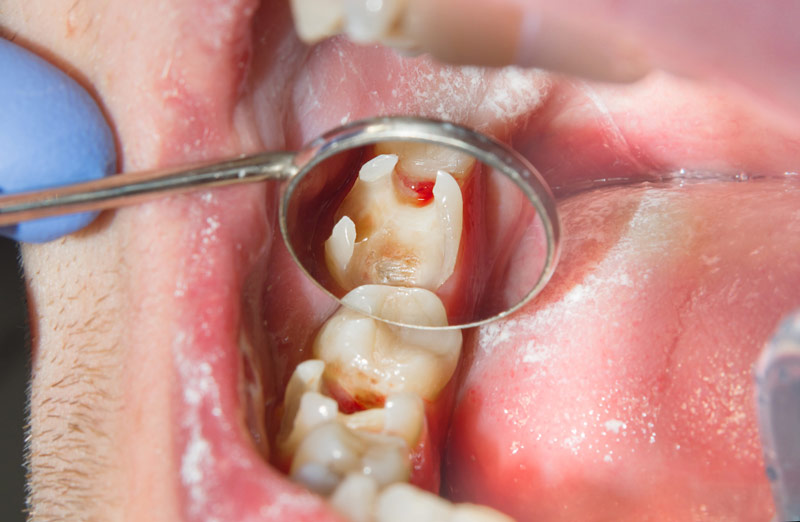7 Common Signs You Need a Root Canal
 When your teeth start talking to you…you should stop and listen.
When your teeth start talking to you…you should stop and listen.
Our body has a number of ways to tell us that something is going wrong. Warning signs alert us to possible infections or other health-related complications and issues. Just as a blinking yellow traffic light signals to us that we should slow down, signs from our body tells us to slow down and pay attention because we may need to address an issue with medical intervention. Likewise, our mouth is full of such warning signs and some of these point to the fact that we may be in dire need of a root canal, even if you have always kept up good oral hygiene.
The idea of a root canal is unsettling to many people, especially those who are squeamish about any dental work—even routine cleaning. However, this is a common procedure with minimal recovery time, and a root canal can prevent long-term pain and infection—and save the natural tooth, which is certainly worth the short-term pain or discomfort!
We will take a quick look at how a root canal works before covering seven of the most common signs and symptoms that you may be in need of this procedure.
What Is a Root Canal?
One way to think of root canal treatment is to picture it as a “deep interior cleaning” and restoration for your damaged tooth or deep cavity. Root canals are often performed by an endodontist, a dentist who specializes in the treatment of dental pulp, or root, but it may be performed by your regular dentist as well. The procedure will typically include the following steps:
1. The endodontist will numb your tooth and place a rubber dam over it, then drill an opening through the crown into your tooth’s pulp chamber.
2. The pulp is then removed and the root canal (which is both a “thing” and a procedure) is cleaned and disinfected.
3. In some cases, the dentist or endodontist will also add medicine to the root canal to address a possible infection, and then they will fill the canal with a rubber-like substance.
4. You will be given a temporary filling to prevent infection.
5. Later, the temporary filling will be removed from your mouth and the tooth will be restored with a permanent filling or crown.
A local anesthetic is used during the root canal procedure to minimize the pain. Patients can also expect to feel some mild pain after a root canal, but it should only last for two to three days at most. The majority of patients can manage the post-procedure pain with over-the-counter pain medications and adequate rest. It is also important to maintain good dental habits after a root canal to prevent additional infections or other issues, and you should be sure to continue to see your dentist for regular cleanings.
7 Signs You Need a Root Canal

Pain. This is the number one sign of a possible infection. If you are experiencing tooth pain, especially while eating or drinking, it may be caused by inflammation and infection.
Temperature Sensitivity. In addition to pain,patients in need of a root canal may notice a new sensitivity to heat or cold. If your favorite milkshake is suddenly causing you to grimace, you may be in need of a root canal. The same is true if your favorite morning cup of coffee has now become a chore to drink because of tooth pain.
Swollen Gums. One of the most obvious visible symptoms of infection is swollen, inflamed, and darker than normal gums. Some patients will also notice a raised bump on the gum line, which is a surefire sign you need to see your dentist and a root canal may be needed as it could be an abscess or something even more sinister lurking under the tooth.
Discolored Teeth. While most of us think of coffee and smoking as the major culprits when it comes to stained enamel, the reality is that a discolored tooth could also be caused by underlying nerve damage. And this may be an indicator that a root canal is needed. If your dental habits are otherwise healthy and you abstain from coffee, tobacco, or other known stain-causing habits, be sure to contact your dentist right away to have the unusual discoloration examined.
Cracked and Chipped Teeth. If you engage in the bad habit of using your teeth as “tools” to open various packages and you crack or chip one of them, your nerves are then exposed to infection. In some cases of cracked and chipped teeth, a root canal will be needed to prevent further infection.
Pressure Sensitivity. Some individuals will experience prolonged sensitivity to pressure, which is one of the symptoms that indicates a root canal may be needed. This kind of sensitivity usually signifies that the root of the tooth has been damaged in some way.For example, if you chew a tough bite of steak and you are still experiencing pain or soreness from that bite days later, this is a warning sign that your pressure sensitivity has increased. As have your chances of needing a root canal!
Tooth Decay. A lack of proper cleaning for extended periods of time may mean you are experiencing tooth decay, which, in turn, could necessitate a root canal. Taking good care of your teeth with regular brushing and flossing is one of the best ways to prevent root canals.
Whatever warning signs you experience when it comes to dental issues and tooth pain such as an infected root canal, they need to be addressed swiftly. Dental-related infections can enter the bloodstream and if left untreated can lead to much more serious health problems. A root canal, by comparison, will seem like a walk in the park compared to the medical intervention that may be necessary if you don’t address these problems as soon as they arise.
